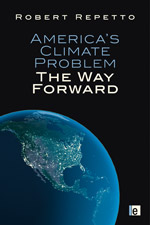 Canadian investigative journalist William Marsden doesn’t hide his anguish or his anger as he reports the maddening incapacity of political leaders and negotiators to come to terms with climate change. Nor should he. It’s a sorry story he has to tell in his new book Fools Rule: Inside the Failed Politics of Climate Change. Marsden’s book treats three sobering realities. One is the science. He writes of the utter desperation of scientists “as they pile proof upon proof only to see it disappear into the smoke of denial or crash against the excuse of political and economic expediency”. He fully grasps the scientific picture and the mounting threats it points to. Regarding the work of glaciologists as fundamental to understanding climate change, he has buttressed his acquaintance with the science by spending time with working scientists in the Canadian Arctic. Last year glaciologist Martin Sharp agreed to Marsden tagging along with his team working on the Devon Island ice cap. Consequently the book includes a lively narrative of the conditions under which those scientists work when on the ice. He leaves the reader in no doubt that the science is “overwhelming and frightening”.
Canadian investigative journalist William Marsden doesn’t hide his anguish or his anger as he reports the maddening incapacity of political leaders and negotiators to come to terms with climate change. Nor should he. It’s a sorry story he has to tell in his new book Fools Rule: Inside the Failed Politics of Climate Change. Marsden’s book treats three sobering realities. One is the science. He writes of the utter desperation of scientists “as they pile proof upon proof only to see it disappear into the smoke of denial or crash against the excuse of political and economic expediency”. He fully grasps the scientific picture and the mounting threats it points to. Regarding the work of glaciologists as fundamental to understanding climate change, he has buttressed his acquaintance with the science by spending time with working scientists in the Canadian Arctic. Last year glaciologist Martin Sharp agreed to Marsden tagging along with his team working on the Devon Island ice cap. Consequently the book includes a lively narrative of the conditions under which those scientists work when on the ice. He leaves the reader in no doubt that the science is “overwhelming and frightening”.
Continue reading “Fools Rule: Inside the Failed Politics of Climate Change”


 America is much better in technology than governance. That’s the sentence that leapt out at me and remained prominent throughout my reading of economist Robert Repetto’s book America’s Climate Problem: The Way Forward. I sought the book for review because, although its focus is on the US, what happens there will crucially affect the rest of us, in terms of both the level of greenhouse gas concentrations in the atmosphere and the likelihood of international agreement to limit them. The book doesn’t exactly inspire hope on either count, but it is constructive in the path it suggests for the US to follow and puts the ball squarely in the court of the policy makers.
America is much better in technology than governance. That’s the sentence that leapt out at me and remained prominent throughout my reading of economist Robert Repetto’s book America’s Climate Problem: The Way Forward. I sought the book for review because, although its focus is on the US, what happens there will crucially affect the rest of us, in terms of both the level of greenhouse gas concentrations in the atmosphere and the likelihood of international agreement to limit them. The book doesn’t exactly inspire hope on either count, but it is constructive in the path it suggests for the US to follow and puts the ball squarely in the court of the policy makers.